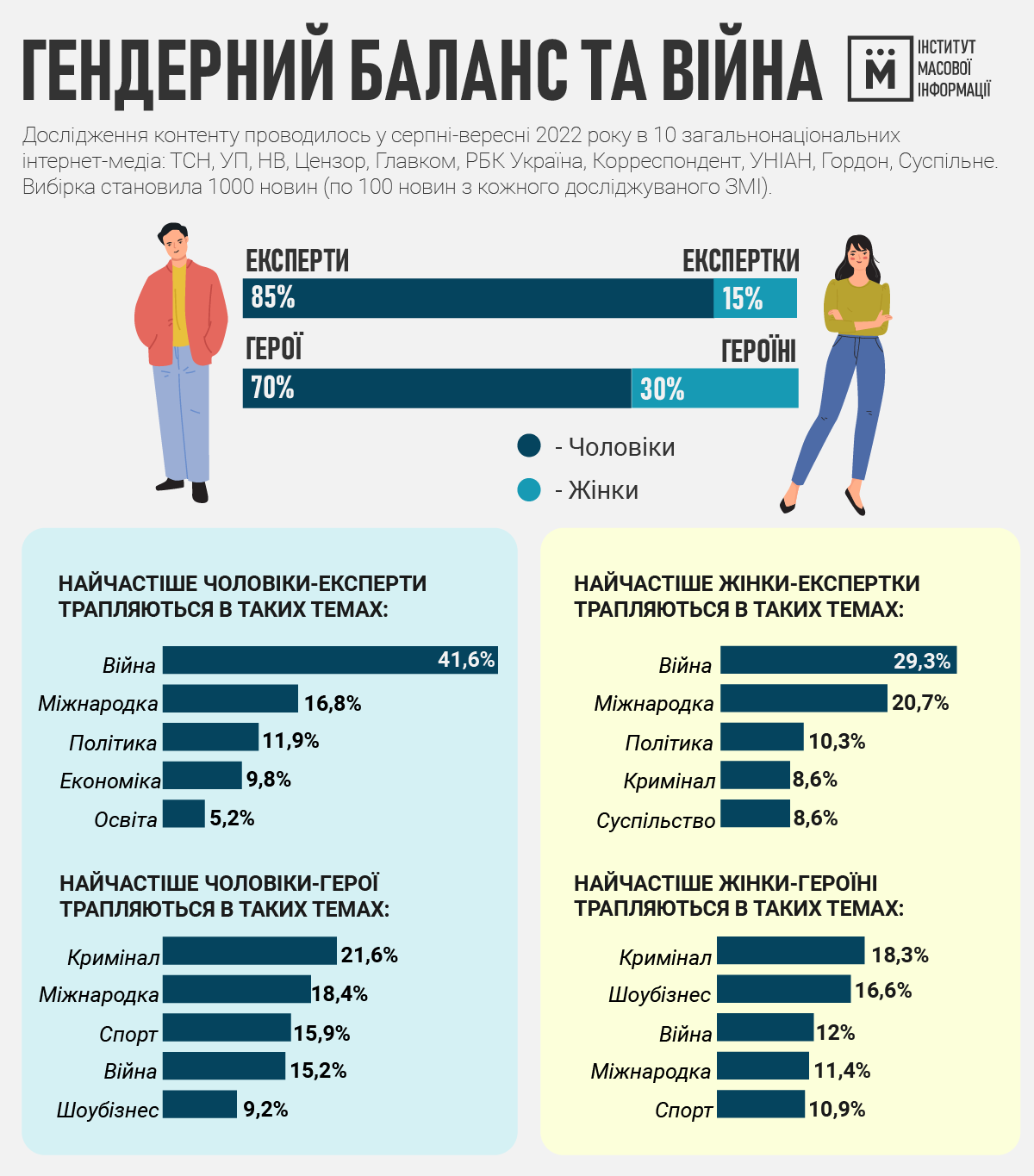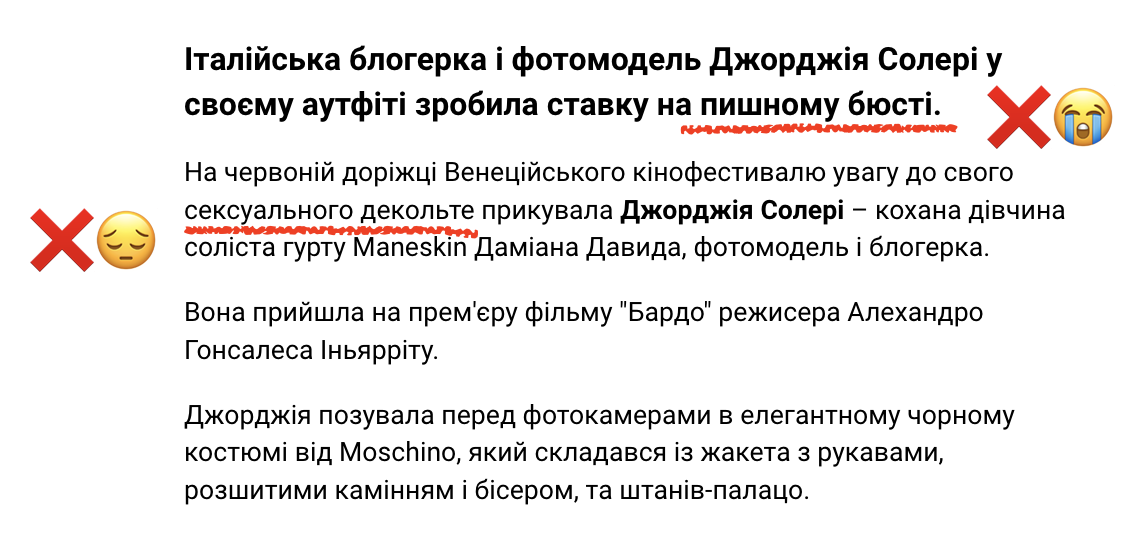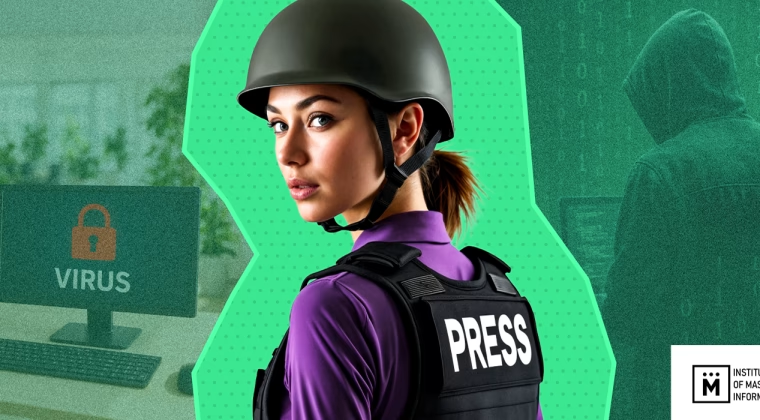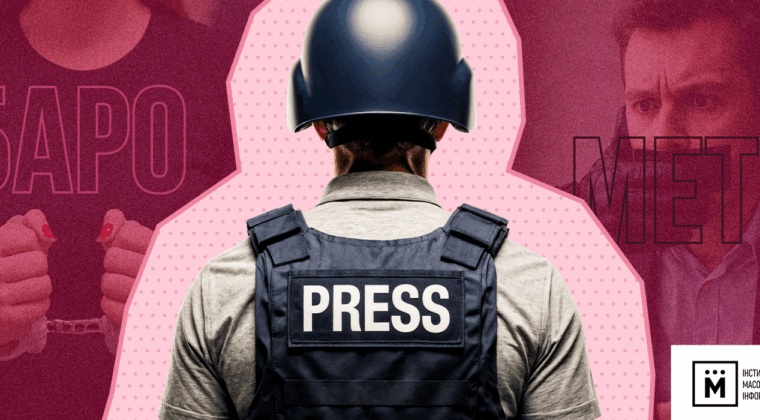Russia’s full-scale invasion has changed the agenda, the thematic diversity, and the experts pool of the mass media. In the third quarter of 2022, IMI researchers found that, on average, 15% of articles cite female experts, while men as experts are represented in 85% of the expert-citing articles in Ukrainian online media. Compared to the previous quarter, the indicator of gender balance in the media has decreased by 1% in favor of men.
These are the data of the media monitoring on gender balance conducted by the Institute of Mass Information in August–September 2022*.
30% of the material features women as heroines, while men are featured in 70% of online media content. Compared to the previous quarter, the presence of heroines has grown by 8%.
MALE AND FEMALE EXPERTS IN ONLINE MEDIA
According to IMI’s research, in the third quarter of 2022, the websites of RBC Ukraine and Suspilne featured the most female experts (22% and 20% of the content with expert commentary respectively). At the same time, the following media outlets involved women as experts the least: Censor (8%), Korrespondent (7%), and Gordon (6%).
As for the thematic content, in the 3rd quarter, female experts most often gave comments on: war and the army (29.3% of all comments by female experts), international affairs (20.7%). Much fewer female experts were involved in commenting on political topics (10.3%), police news, and societal topics (8.6% each). The mentions of female experts in business, economics, human rights, science, and weather were scant.

According to IMI’s research data, female experts commented on the news about the war most often. Such material amounted to almost a third (29.3%). Most of the comments on the subject of the war were taken from the head of the United Coordination Press Center of the Defense Forces of Ukraine “Pivden,” Natalia Humenyuk. Content with expert comments by Humenyuk was about the occupiers’ losses, the liberation of occupied settlements, and operational information in the Kherson direction.
- UAF destroys another ruscist base in Kherson (video)
- OC Pivden comments on the liberation of villages in Kherson oblast
- Kherson oblast situation: RF’s troops unable to pull their reserves to Kherson oblast, the logistics is undermined
In addition to Humenyuk, comments on the war and the Russians’ missile strikes were given by the spokeswoman of the Donetsk military administration Tetyana Ihnatchenko:
In articles related to the international affairs (20.7% of all comments by female experts), the media most often cited the President of the European Commission, Ursula von der Leyen. In these articles, the expert stated that the EU should cap the price of Russian gas in order to prevent Putin’s attempts to manipulate the energy market.
- Sanctions against Russia – the European Commission calls for a price cap for Russian gas
- Ursula von der Leyen calls on the EU to cap the gas prices for Russia and to save up energy
- Limiting the prices for Russian gas – the European Commission is considering a price cap
Ukrainian news outlets also published expert comments by foreign leaders, namely the Minister of Defense of the Netherlands Kajsa Ollongren and the Minister of Defense of Austria Claudia Tanner regarding the support for Ukraine.
- EU’s training mission for the UAF – Austria wants to verify if the EU legislation allows creating one
- At least several EU countries are ready to support a training mission for Ukrainian soldiers
There were also articles citing the head of the German Foreign Ministry, Annalena Baerbock, about Germany suggesting that EU countries suspend the simplified visa regime with Russia.
As for articles on politics, most of the comments in the media were provided by Olha Vasylevska-Smahliuk, a People’s Deputy from the Finance Committee of the Verkhovna Rada, SotP faction.
- Excise duty on fuel returns: VR Finance Committee explains how it will affect the prices for drivers
- What will happen to the fuel prices after the return of excise duty – Plha Vasylevska-Smahliuk
In addition, there were occasional comments from Deputy Minister of Social Policy Ulyana Tokareva and Kyiv City Council member Ksenia Semenova, a member of the renaming commission.
- Kyiv City Council approves new street names and new sign layout: who will pay for them and how much
- The Ministry of Social Policy speaks about compensation in the case of madatory evacuation
8.6% of all articles citing female experts was about police news. Expert comments on this topic were coming from the spokeswomen of the regional police departments and the Ministry of Emergency Situations.
- Dead man found on the railway track in Popilnya
- 16 year old boy dies in a quad bike accident in Novhorod-Siversky district
- Tiger sellers exposed in Kyiv
- 19 people drown in Chernihiv oblast this summer
Another 8.6% of articles with quotes from female experts were about social issues. The experts cited in these articles were psychologists and volunteers.
- To go to school or to stay at home? Psychologist gives advise to parents
- Kropyvnytsky volunteers collect stationary for children IDPs
As for male experts in online media, their comments most often occurred in articles about the war (41.6% of all comments from male experts). Much less men commented on international affairs (16.8%), politics (11.9%), business and economy (9.8%), and education (5.2%).
Almost half of comments from male experts were about the war (41.6%). A significant part of this expertise concerned the rocket attacks on Ukrainian cities. Ukrainian politicians and officials provided comments on the effect of the war in their regions. During the monitoring period, the most comments came from Melitopol Mayor Ivan Fedorov, head of the Mykolaiv RMA Vitaliy Kim, head of the Sumy RMA Dmytro Zhyvytsky, head of the Kharkiv RMA Oleh Syniehubov, Mariupol Mayor Petro Andryushchenko, and Kharkiv Mayor Ihor Terekhov.
- Russia shells Kharkiv city center. Terekhov says five people are dead
- Explosions in Melitopol: Fedorov explains the consequences for the occupiers
- Sumy oblast: September 2 shelling results in a forest fire in Krasnopillya hromada
- Convoy of tanks moves towards Berdyansk through Mariupol
- Russian troops fire 16 S-300 rockets at Mykolaiv
Ukrainian media also published expert opinions from military and intelligence officers.
- Skibitsky speaks about the lack of personnel in the Russian army
- Russia can employ up to 350 thousand more troops in the war against Ukraine – intelligence
16.8% of articles featuring comments by male experts were related to international affairs. These articles were mostly about the war in Ukraine:
- Minister of Defense of Slovakia wants to discuss giving MiG-29 jets to Ukraine with his EU colleagues
- Borrel expects the EU ministers to “greenlight” the training mission for Ukrainian soldiers
- Support for Ukraine: Latvia has already provided Ukraine with almost EUR 300 million of aid
The media articles about politics (11,9%) most oftenly quoted Ukrainian President Volodymyr Zelensky. His statements and comments were about the war and Ukraine’s potential.
- Zelensky names the factors that would facilitate the start of negotiations with the RF
- Zelensky Volodymyr: Ukraine may become Europe’s green energy hub
- Ukraine may become one of the biggest food manufacturers in the world – Zelensky
- Sanctions and visa restrictions must make the Russians feel the cost of their aggression against Ukraine – Zelensky
There were also occasional articles with expert comments from Ukrainian officials and ministers:
- Danilov says what made him cry and why Zelensky swears sometimes
- Shmyhal says the calls for negotiations with Putin are weakness and hypocrisy
- Ukraine is implementing the best European practices for farmaceutics regulation – Minister Lyashko
In 9.8% of articles, men were business and economics experts.
One of the top experts on this topic was Minister of Infrastructure Oleksandr Kubrakov, who commented on the successful export of Ukrainian agricultural products through sea ports.
- Six ships leave Ukrainian sea ports at once – Korrespondent.net
- Ukrainian grain: First UN-charteres ship carrying Ukrainian agricultural production reaches Africa
- First month of the green corridor, summarized
- Infrastructure Minister Oleksandr Kubrakov: on fuel prices and the grain corridor | Economic Pravda
In addition, experts commented on the information that “the gas crisis in Europe may last several winters.” They also said talked about the positive effect that the export of metal products, grain, and oil crops will have on Ukraine’s budget.
- Deblocking the ports for exporting metal products will ensure that the budget receives more payments – economist
- Buckwheat prices will drop in Ukraine: expert says when and how much
- Grain and oil exports from Ukraine in 2022/23 MY will amount to 65-70 million tons
There were also occasional comments from men on the following subjects: education, cime, society, human rights, healthcare, and IT.
HEROINES AND HEROES IN ONLINE MEDIA
The percent of female heroines has grown by 8% compared to the previous quarter and now amounts to 30%. The representation of men still remains almost twice as high – 70%.
The leaders in involving women as news heroines are TSN (47% of the total number of heroes) and UNIAN (41%). Although TSN traditionally maintains a high rate of the female presences, this website does mention women in some sexist articles, namely those related to show business.
During the monitoring period, the fewest female heroines were recorded on the websites of NV (9% of all news heroes and heroines) and RBC Ukraine (11%). However, these media broadcasted no sexist or discriminatory messages against women.
Most often online media mentioned women as heroines in police news, (18.3%), news about show business (16.6%), war (12%), international affairs (11.4%), and sports (10.9%).
Women most often appeared as heroines in police news (18.3% of all mentions of heroines). During the monitoring period, there were plenty police news about female collaborators and separatists leaking sensitive information about the UAF to the Russians.
- Wife of a UAF fighter has been leaking intelligence to the RF – Ukrainian news
- Three traitors exposed in Luhansk oblast: Three more female traitors, including a Russian propaganda star, exposed in Luhansk oblast – SBU
- Leaking the UAF’s coordinates: Dnipropetrovsk oblast woman suspected of treason
The police news also featured women who were car accident victims or violated the Criminal Code of Ukraine.
As for show business news, such articles accounted for 16.6% of all mentions of women as heroines. Interestingly, this survey recorded significantly fewer articles about war and celebrities, contrasted with the previous results. This time, the content was mostly about the private lives of famous people, which indicates a certain degree of being accustomed to the war and show business returning to its usual PR practices.
- Britney Spears’s sons talk about their feelings towards their mother for the first time
- Nobody’s going to believe me: Nastya Kamenskykh says clearly if she is pregnant now
- Masha Yefrosynina responds to the haters calling her an old anorexic
UNIAN editors also decided to remind us how the Russians are doing.
TSN editors released some sexist articles about women. For example, in the article about the celebrity Giorgia Soleri, the editor uses every sentence in the headline to emphasize that the woman has a bust. Such messages devalue her as a professional and a person, presenting her merely as a sexual object.

12% of the articles featuring women as heroines were about the war. Due to the full-scale war, the heroines such articles are usually shelling victims or close relatives of the fallen defenders.
- Bodies of two women killed by the August 27 shelling found in Kharkiv oblast
- Fighter Dmytro Tkachenko from Poltava oblast dies in the war with Russia
There were also occasional articles about the women who serve in the army:
- Mass media show Ukrainian students getting their education in the trenches and in lulls between battles (video)
- Olha Taran. The story of the medic saving the wounded in Mariupol
The heroines of articles about international affairs (11,4%) were mostly international or European leaders.
- Germans criticize head of MFA for her statements in support of Ukraine
- Assassination attempt on Vice President of Argentina takes place, but the gun misfires
- Hillary Clinton sides with Sanna Marin in the party scandal
Some articles also featured Russian women: European Parliament deputy Tatyana Zdanok, Russian propagandist Dugina, and Putin’s daughters.
- Not in the state language: Latvian President’s office ignores the letter from a Russian speaking European Parliament deputy
- Latvian President ignores a deputy’s letter written in Russian
- Dugina’s murder: Russian propaganda shares archive photos of the so-called suspect
Nearly every ninth article featuring women as heroines was about sports (10,9%). Mostly the heroines of these articles were Ukrainian tennis and beach soccer players.
- Sensational triumph: 20 year old Ukrainian woman defeats the world’s former first racket at US Open-2022 (video)
- Yulia Dekhtiar strikes two goals for Ukraine’s team
- Two Ukrainian women make it to the second round of doubles at US Open
The monitoring period also saw occasional mentions of women as heroines in articles about education, the society, culture, human rights, and healthcare.
As for men as news heroes, the most mentions of them were in police news (21.6%), articles on international affairs (18.4%), sports (15.9%), war (15.2% ) and show business (9.2%).
In the police news, most articles featuring men as heroes portrayed them as separatists and collaborators who cooperate with the Russians.
- Ukrainian man was involving pensioners in collecting information about the UAF in Kharkiv oblast
- Sentence for Ternopil man supporting the war in Ukraine has been reduced
- Enerhodar gauleiter enables the illegal export of 140 thousand tons of grain
- Kharkiv man poses as utilities worker to spy for the RF – SBU
There were also some police news articles featuring men as victims or criminals.
- Students in Kyiv beat a passer-by to death
- Police officers confiscate 400 exotic animals in Kyiv
- Kharkiv man suspected of a €600 thousand fraud in Europe
- Cash transportation: Customs officer to be tried for bribery
In articles on international affairs, the featured men were mostly Russian officials and politicians.
- Will Putin resign willingly or not – experts comment on the prospects of a leadership change in the RF
- State Duma ex-deputy about Navalny: His views are imperialistic
- When your career is hanging by a thread. Shoigu brags about “taking” Pisky village for the fourth time
- EU expands the list of sanctions against Russia
Most articles about sports featured Ukrainian boxer Oleksandr Usyk.
- Usyk names the stadium where he would like to end his career
- Usyk shares the fate of his house near Kyiv with Berinchyk
- Usyk comments on Joshua’s words about the civil war in Ukraine
There were also occasional mentions of other sportsmen, including the articles about sports traumas:
- Tyson speaks about the disease that put him in a wheelchair
- Shasktar defender Kornienko out of the game for the rest of the year – details
- I had it coming: tennis legend crushes his own nose with a racket during a match at US Open-2022 (video)
In most articles about the war (15,2%), the featured men were soldiers who were killed in action or by Russian shelling.
- Fighter Dmytro Tkachenko from Poltava oblast dies in the war with Russia
- World Sambo Championship winner Zeleniuk dies fighting Russian occupiers for Ukraine
- Semen Oblomey dreamt of treating sick trees. The war took his life, but his cause will live on in the capital’s botanical garden
- Andriy Mykolyuk from Khmelnytsky oblast dies defending Ukraine
Men as heroes were also featured in articles about show business, business and economy, politics, culture, and society.
FEMININE FORMS OF TITLES
IMI researchers recorded that 30% of the media included in the monitoring still do not adhere to the use of feminine forms of job titles in their articles. Such violations were recorded on the websites of RBC Ukraine, Korrespondent, and UNIAN. For example, the editors of RBC Ukraine ignore the use of feminine forms while referring to Natalia Humenyuk, head of the joint coordination press center of the Defense Forces of Ukraine “Pivden.” The editors use the lexeme kerivnyk (masculine form of “head,” as opposed to kerivnytsia). Or in the article quoting the Austrian Minister of Defense Claudia Tanner (RBC Ukraine – minister, not ministerka). If you are in doubt about how to create the feminine form correctly, linguists advise using “Mrs. Minister,” which will be according to the rules and count as a feminine form.
In the case of Korrespondent, there were also cases when journalists did not use the feminine form, for example, “Emily Thornberry is the Labor Party’s shadow minister for trade.”
UNIAN journalists used the word nachalnyk (boss) instead of nachalnytsia in the texts mentioning Natalya Humenyuk. Also, in the media, there are systematic problems when quoting weather forecaster Natalka Didenko, who is often called a “blogger and synoptyk (weatherman).”
⚡️ If your media is not sure where to start improving their gender balance, we suggest you do a self-assessment and count how many female experts and heroines you have, and how many male experts and heroes. We guarantee you will be surprised. We at IMI have also prepared tips for media outlets willing to improve their gender balance: 10 Gender Balance Recommendations for Journalists.
* The content research was conducted in August–September 2022 in 10 national online media: TSN, UP, NV, Censor, Glavkom, RBC Ukraine, Korrespondent, UNIAN, Gordon, Suspilne. The sample included 1,000 news items (100 news items from each of the surveyed media outlet).



